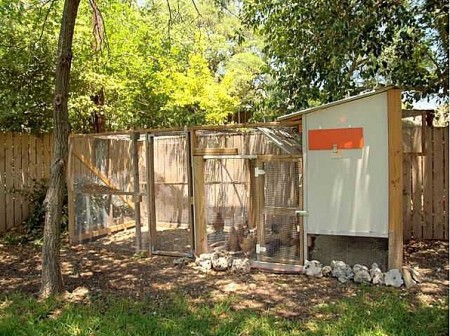Do your neighbors make strange clucking sounds? Have you noticed any nasal-awaking scents of earthy fertilizer?
With a local food movement, a downsized economy and more people eager to find practical and hands-on methods of satisfying some basic needs, it could mean finding yourself living amongst chickens, goats, rows of lettuce or a forest of towering tomato vines.
Welcome to the new era of urban farming.
Residents within the limits of many U.S. cities are learning that some neighbors want to make more full use of their property. And that has put some pressure on municipalities to revisit local laws that regulate the occupancy and management of animals and crops.
According to the USDA, urban farming is booming with around “15 percent of the world’s food now grown in urban areas.” The numbers have been goosed thanks to national, local and healthy food advocates like Michelle Obama and her White House garden and Detroit Mayor Dave Bing, who has a plan for converting vacant lots into farm space. The new interest in urban gardening and farming could push the movement beyond the victory gardens during World War II.
Erik Knutzen, author of “The Urban Homestead,” “Making it: Radical Home Ec for a Post-Consumer World” and the blog rootsimple.com, said several factors are in play.
“Bad economic times get people thinking about common sense ways to use their yards. Why grow a lawn when you can grow food?” Knutzen said. “People are also concerned about where their food comes from. There’s been a lot of scandals with our factory farm system and the only way to deal with it is to grow your own.”
Many urban governments see it as a way to encourage healthy living. It is also a way for people to make a connection with nature. Judi Gerber, who writes the blog LA Farm Girl, said urban farming can take shape in different ways, including a “mini-farm literally on one acre of more or even just a backyard edible garden.”
In all its forms, however, urban farming ultimately requires the support of the city, otherwise the lack of regulation pits neighbor against neighbor in a conflict over appropriate land use.
In July 2011, a woman in Oak Park, MI — a suburb of Detroit — was criminally charged for growing a vegetable garden in front yard space, reported ABC News.
This incident makes it apparent that municipalities should have codes in place that citizens can easily understand so they are not unwittingly violating laws. Gerber suggests to check city, county and local laws and regulations that may limit how and what you grow and whether you can have farm animals at all. (Gerber says where she lives in L.A. prohibits animal husbandry.)
While some suburbs, like Oak Park, have shut down urban farms, some cities embrace it completely:
- Seattle, WA: Allows residents to keep up to three small goats on standard lots. Residents with larger lots may keep up to four small animals, with additional animals permitted depending on lot size.
- Cleveland, OH: Residents can keep up to eight chickens or rabbits on a regular-size urban lot.
- San Francisco, CA: Up to four small animals total kept 20 feet from doors or windows in a coop or enclosure of approved type.
- Los Angeles, CA: Unlimited number of chickens with space requirements.
- Denver, CO: $50 chicken permit plus additional annual $70 fee.
- Miami,FL: May have up to 15 hens, no roosters. But must be contained at least 100 feet from neighboring structures. The South Florida Food Policy Council advises cities on best urban farm practices.
- Detroit, MI: No “farm animals.”
- New York City, NY: Chickens are considered pets but must be kept following the specific Health Code.
- Houston, TX: Chickens may be kept on a lot which measures at least 65 feet X 125 feet.
But regardless of your city codes, it’s best to be on good terms with your neighbors, said Knutzen. In places where some things aren’t legal, you can organize your neighbors and change the law.
“Some of my friends and neighbors helped change the code in Los Angeles to make growing fruit, flowers and nuts in a residential zone and selling them legal,” he said. “There’s some folks in LA working on making bees legal.”
If you’re interested in starting your own urban farm, start researching local regulations and zoning laws, advises Gerber.
“As for gardening,” says Knutzen, “It’s really important to get a soil test if you’re considering buying a house. Contact a local lab and get a test for soil fertility as well as heavy metals such as lead, chromium and arsenic.”
With the growth of urban farming, Gerber advises that you check resources for the new gardener or chicken keeper.
“Get all the information you can before you get started,” Gerber said. “Take garden classes via local extension offices or master gardener programs, and use online and traditional print resources.”
Send questions/comments to the editors.


